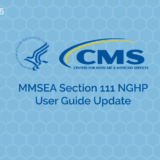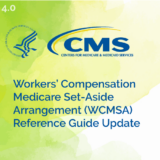Is Self-Administering Your MSA the Right Choice?
February 6, 2023 by Sandy Simpson

When an individual has a Medicare Set-Aside (MSA) account, they have the option to either self-administer the funds or have them professionally administered. If self-administration is chosen, it can be a difficult and trying task to comply with the CMS’ rules; opening a MSA checking account, learning what type of expenses can be paid and cannot be paid out, coordinating health insurance benefits, keeping accurate records, and when to send reporting to CMS. This blog will discuss what you need to know if you choose Self-Administration, and if self-administering your MSA is the right choice for you.
What is Self-Administration?
Self-administration is the process of managing the medical portion of your settlement, compromise and release, judgment, award or other payment/arrangement (“Settlement”) arising from an incident on the job and/or due to the negligence of another party. After a settlement, the individual is responsible for paying the medical claims following the process and guidelines set forth by the Centers for Medicare & Medicaid Services until the funds have been permanently depleted.
What is Professional Administration?
Professional administration is the practice of using a qualified third party to oversee and manage funds for future medical expenses following a liability or Workers’ Compensation settlement. Though not required, Medicare strongly suggests the professional administration of a MSA. However, for those who choose self-administration, the individual is still responsible for using their MSA account to pay for injury-related and Medicare covered expenses in accordance with the Medicare Secondary Payer (MSP) Statute. The MSP provisions protect Medicare Trust Funds by ensuring that Medicare does not pay for items and services that certain health insurance or coverage, such as a MSA account, is primarily responsible for paying.
Two Ways to Fund Your MSA Account
Before the settlement has occurred, the settling parties will discuss the ways a MSA account can be funded. Typically, there are two options:
-
Lump-Sum – a single lump sum payment to fund your MSA account.
-
Structured Settlement Annuity Funding – an initial deposit to fund your account and smaller annual deposits in the following years. The initial deposit covers the first two years of annual funding for treatments plus any cost for proposed first surgeries. If the MSA funds are not spent down in a given year, the funds must remain in the account and carry forward into the next year.
Establishing a Self-Administration Bank Account
Below is a list of CMS’ requirements regarding opening up a separate bank account for the MSA funds.
-
Deposit MSA funds into its own account, separate from any other accounts you may have
-
The account must earn interest and the interest must stay in the account
-
The account should be insured by Federal Deposit Insurance Corporation (FDIC)
-
Choose a bank or an account that does not charge fees if you have a low balance
-
Select an account that allows you to write checks

Know What Is Covered
It is important to recognize that not every medical bill or service can be paid out of the MSA account. For individuals self-administering their account, it is highly important to be aware of qualified expenses. Below is a partial list of the expenses that can and cannot be paid out of the account:
Expenses That Can Be Paid
-
Funds can only be used to pay for future care that is Medicare covered and related to your injury.
-
Cost of copying documents
-
Mailing fees/postage
-
Any banking fees related to the account
-
Paying income tax on the interest income earned in the account*
*Note – The MSA funds are not considered taxable income, but the interest earned is taxable. Each year your bank will issue an IRS 1099-INT form for the interest earned in the account.
Expenses That Cannot Be Paid
-
Fees for trustees, custodians, or other professionals hired to help administer the account
-
Expenses for administration of the MSA other than those listed above
-
Attorney costs for establishing the MSA
-
Cannot use to purchase a Medicare supplemental insurance policy or a Medigap policy
-
Medicare premiums, co-payments, and deductibles
-
Acupuncture
-
Routine dental care
-
Eyeglasses
-
Hearing aides
For a more extensive list of what Medicare will pay, click here to obtain a copy of the free handbook “Medicare & You”.
Keep Accurate Records of All Transactions
Bank statements, receipts, and tax records should all be kept and recorded. Self-administering parties will not need to submit these records annually, but Medicare may request them as proof that the account is being used correctly. It is also recommended that settlement documents showing the date the case was settled, diagnosed injury, and date of injury are also kept. Consider keeping accurate records for each transaction such as:
-
Transaction date
-
Check number
-
“Payable to” or provider’s name
-
Date of service
-
Description – procedure, service or item received, deposit, interest, other allowable expenses
-
Amount paid
-
Deposit amount
-
Account balance
-
Interest earned
What is Coordination of Benefits for a MSA?
The MSP program is in place to ensure that Medicare is aware of situations where it should not be the primary payer of claims. Sometimes a Medicare beneficiary with a MSA account, public benefits, and other health insurance; the Coordination of Benefits (COB) rule decides which entity should pay first on a claim. In certain situations, if Medicare has paid a claim by mistake, CMS will take action to receive the mistaken Medicare payment.
What is the MSA Attestation?
If the MSA proposal was approved, CMS requires the attestation form to be signed, attesting that the injured party has used the account correctly and to report the amounts spent. If Medicare is satisfied that the right amount of money has been spent appropriately, Medicare will pay for future treatments for this work injury. Below is the information found on the attestation form.
-
Total spent for medical services
-
Total spent for prescription drugs
-
Grand total of expenditures
-
Total of interest income the account earned if any
-
Balance of MSA account at the end of the calendar year
Annual Attestation or Expenditure Letters Reporting
CMS’ Benefit Coordination & Records Center (BCRC) is responsible for monitoring and receiving the submitted attestations forms. The attestation informs Medicare that they are now primary payer when your funds have exhausted. Note, once the account funds are exhausted you must continue to pay your Medicare monthly premiums, co-pays, and deductibles in order for Medicare to pay your claims. CMS has the right to demand and receive a complete accounting of payments made from the account at its discretion. The following only applies if the MSA proposal has been approved by CMS.
-
Annual Attestations must be submitted every year, no later than 30 days after the end of each reporting period (beginning one year from the date of establishment of the MSA account). Annual attestations should continue through final exhaustion of the account.
-
Temporary Exhaustion occurs when the MSA account funds have exhausted before the next annuity has been deposited into the account.
-
Final Depletion or Permanent Exhaustion is where the MSA account has no money left and no future deposits of funds are expected.
-
Death Occurs / Inheritance before the MSA account is permanently exhausted you will need to notify the BCRC of death. This may require the MSA account to stay open for some time to pay outstanding claims.
-
Completely Exhausted within 60 days of the date the MSA account is depleted, send the BCRC a final attestation that the account is ‘Completely Exhausted”.
-
Loses Medicare Entitlement
-
Re-Establishes Medicare Entitlement
How to Submit Your Attestation to CMS’ BCRC
-
Electronical Attestation is a Medicare web portal that allows submission of either yearly or final attestations electronically. For more information about how to submit an attestation electronically, please see the MSAP User Guide.
-
Mail-in Submission / Paper Copy
MSA Proposal/Final Settlement
PO Box 138899
Oklahoma City, OK 73113-8899
-
Call BCRC
855-798-2627 or TTY/TDD
855-787-2627 for the hearing and speech impaired
Opened: Monday – Friday, from 8am – 8pm | Eastern Time
Medivest’s Solutions
If handling a Self-Administrated account becomes too difficult of a task, Medivest can help. We provide the following options that may reduce the burden of keeping track of the details:
1. Switch to Medivest’s Professional Administration Service
For over 25 years, Medivest has been helping clients navigate the complexities of the MSP and protecting their Medicare benefits. Our services guarantee the most comprehensive and cost-effective professional administration program available and provides:
-
Streamlined reporting and compliance
-
Savings on treatment, equipment, and pharmaceuticals
-
Expert support and service
2. Purchase Medivest’s Self-Administration Kit
Medivest offers a Self-Administration Kit that equips individuals who opt to manage their own Worker’ Compensation or Liability settlement with many of the tools and services available to Professionally Administers settlements. The Medivest Self-Administration Kit has been designed to give the individual the flexibility in determining just how “hands-on” they wish to be in managing their medical funds, while providing to the settling parties the piece of mind that comes from knowing due diligence has been considered. Below are the services that are included Medivest’s Self-Administration Kit Services:
-
Detailed Booklet
-
Unlimited Phone
-
Medical Bill Review
-
Pharmacy and Durable Medical & Equipment (DME) Discounts
For additional information regarding Medivest’s Professional Administration Services or Self-Administration Kits or to get started with one of these options today call us at 877.725.2467 or contact us here.





